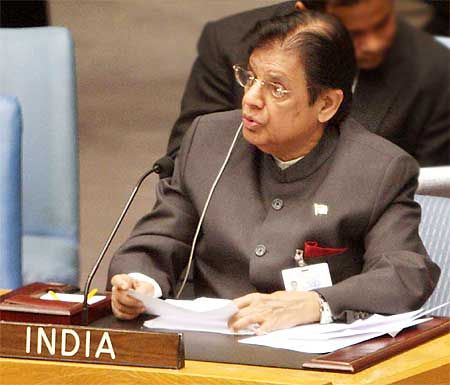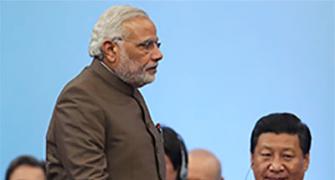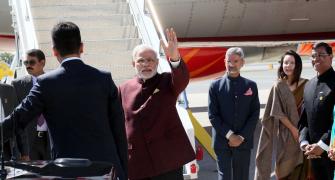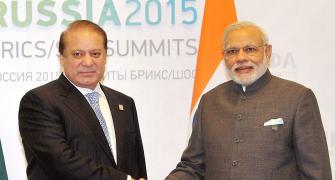'E Ahamed will be sorely missed as a decent and wise man who made the best use of his political career and personal abilities for the good of the nation,' remembers Ambassador T P Sreenivasan.

'He earned the nickname "Permanent Representative" at the UN as the official Permanent Representatives kept changing, while he returned every year.'
A political leader who avoided controversy and confrontation throughout his life, E Ahamed, must have turned in his grave if he heard that his sudden and painless departure from this world led to an ugly argument on the time and nature of his demise.
It is hard to believe that the government delayed the announcement of his death for fear that it would upset the presentation of the Budget.
Such a Machiavellian design appears beyond the capacity of any government in India.
Even if it tried, the kind of chaotic situation that prevails in hospitals would not have permitted the execution of the plan.
The sooner the matter is allowed to rest, the easier it will be for his noble soul to rest in peace.
Ahamed had a long political career in which he was a minister in Kerala and a minister of state at the Centre for ten years. He did not fulfill his dream to become a Cabinet minister, when many people junior to him overtook him.
But he did not allow his frustration to be visible as he knew his limitations as a person and as the leader of the Muslim League in the national context.
He soldiered on like a disciplined member of the team, hiding his frustrations behind his good cheer, simplicity and friendliness, making the best of the opportunities he got to serve the nation and to find fulfillment.
He found a haven in the ministry of external affairs as his forays into the railways and HRD did not give him any reprieve from playing second fiddle.
It was long before he became MoS that Prime Minister P V Narasimha Rao discovered his talents as a pleasant, well dressed and sophisticated Muslim to be projected at the United Nations.
He earned the nickname 'Permanent Representative' at the UN as the official Permanent Representatives kept changing, while he returned every year.
Unlike some other MPs who came to the UN General Assembly, he was very law abiding and did not seek to change India's official positions.
He recognised his role and confined himself to working quietly with Islamic countries.
He intervened in the debates on a variety of subjects on the lines of India's policy.
On Kashmir, he articulated the Indian position that Kashmir is an integral part of India, Pakistan must stop cross border terrorism and that no Muslim in India would want a change in the status of Jammu and Kashmir as the state was a symbol of Indian secularism.
He did not want to grab the headlines by using strong language against Pakistan even when provoked.
He saw his role as a catalyst in normalising relations with Pakistan rather than as an adversary.
Pakistan's deputy permanent representative at the time was particularly foul mouthed, but Ahamed did not pay back in the same coin.
For instance, the Pakistani diplomat called India 'the sick man of Asia' in a reference to the then external affairs minister, Dinesh Singh, who was unwell when he visited the UN.
Ahamed's style was to counter Pakistan's propaganda through private conversations and dignified behaviour.
He won many friends among diplomats, regardless of rank and position.
His experience at the UN was an asset to him during his stint as minister of state in the Manmohan Singh government, mostly in the ministry of external affairs from 2004 to 2014.
The position of the MoS in the MEA is not a particularly important one in the current dispensation.
Foreign policy is made in the PMO with the marginal and largely formal involvement by the EAM and implemented by the foreign secretary and the rest of the bureaucracy.
The MoS is a mere cog in the wheel without a continuing and indispensable role.
To be powerful in the MEA, a person has to be responsible for the major powers or administration dealing with postings and transfers of IFS officers.
Without such responsibilities, the ministers of state do not count in the hierarchy.
Except in rare cases. like K Natwar Singh, who pushed his way around because of his proximity to the prime minister, ministers of state perform marginal and ceremonial functions.
They are tolerated at best and ignored at worst and most of them are frustrated that they are not part of the big game.
They come to the limelight only when they stand in for the EAM or the PM occasionally.
Many of them, who are political lightweights tolerate the reality and enjoy the perks of travel and semblance of importance.
Patience rather than push get them rewards such as Cabinet positions in other ministries.
Some revolt and move away and others get into trouble by speaking out of turn or engaging in turf battles.
Ahamed was frustrated at times, but he decided to do an honest job, wherever he was sent.
The natural niche that he acquired was in the Arab world and he built a vast circle of friends there and enjoyed the assignment rather than complain about his role in the government.
Being a Keralite was an obvious advantage in the Arab countries because of the large Kerala populations there, though he had to contend with another Keralite, Vayalar Ravi as the minister of overseas Indian affairs.
Ahamed's party made occasional demands for him to be elevated to a higher position and more substantive work and that explains his moves to the railways and HRD. But he preferred to return to the MEA as he felt comfortable and useful.
What he could not get by the hierarchy, he gained by his personal charm and friendliness.
The IFS liked him and treated him with respect.
Ahamed was a regular visitor to New York during my stint there and became a friend of the whole family because of his charming ways.
He spent long hours with us in New York and outside and we worked closely at the UN itself.
He took my advice on several matters and his wisdom and political experience were a boon in my own work.
There was no occasion for us to differ on any official or personal matters.
Even after I left New York, we were in touch and participated together in Diaspora gatherings.
I even took the liberty of occasional banter like when I observed at a gathering that India had 'E-Ahamed' before the advent of E-mails and E-Everything.
He had a hearty laugh and quoted it on other occasions.
The last gesture he made to me was the invitation he extended to me to speak at Rashtrapati Bhavan, when his collection of speeches was launched by the Rashtrapati. He publicly acknowledged that many of the speeches were originally drafted by me.
E Ahamed will be sorely missed as a decent and wise man, who made the best use of his political career and personal abilities for the good of the nation.
As a leader of the Muslim League, he spoke for the Muslims and other minorities, but within the framework of a secular and democratic India.
T P Sreenivasan, (IFS 1967) former Ambassador of India and Governor for India of the IAEA, is Chairman, Academic Council and Director, NSS Academy of Civil Services, Director General, Kerala International Centre.
MORE FASCINATING features in the RELATED LINKS below.









